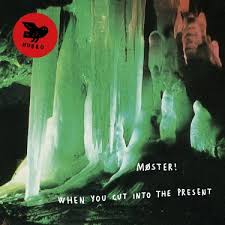Kjetil Møster must have a head for heights. As ‘Nebula And Red Giant’ opens this third album from Møster’s power quartet, the band leader seems to be floating in deep space free from any satellites or lunar orbits attempting to drag him down to Earth. His saxophone rings with a purity and clarity that can only come from time spent in heavenly solitude. But these sweet moments can never last, and Møster’s reverie is swiftly blown apart by a distant detonation which shakes him from his starry perch and sends him plummeting down through hemispheres and planetary layers like a falling angel turned to fiery Balrog. The further and faster Møster plunges, the more furiously he plays, as though enraged by the shockwaves and tremors which now buffet him, until he finally crashes down into a bubbling molten core.
Møster’s frenzied descent easily equals, and possibly surmounts, anything from 2014’s outstanding Inner Earth on which the Møster! four-piece brewed up a delirious jazz-rock fusion as they drilled through accumulated crusts of existence and shared knowledge in search of primal truths. Initial impressions of When You Cut Into The Present imply similar tangents being explored, to the extent of this perhaps being a companion piece to Inner Earth. A luminous stalactite-clustered underground cavern aglow with psyched-out promise adorns the sleeve, much as depicted on last year’s album.
But where Inner Earth mapped a slow, tumultuous journey gradually building to an explosive finale set deep within the planet’s infernally spasming bowels, When You Cut Into The Present, following those brief opening moments in which the group cling to a vertiginous sky, destroys any notions of leisurely travel. We are dive-bombed straight into the heart of electrified underground chambers, where primeval jazz-rock ooze is solidifying at heart-stopping speed and raw materials soak up their surroundings at breakneck velocities to mould new primordial forms. Inner Earth was a voyage back to a creation point, whereas When You Cut Into The Present penetrates immediately into the very second of inception. That apposite title reflects perfectly upon the fused elements and the concisely sinewy, stripped-back record here.
With William Burroughs’ words as clear influence, (as continued in the third piece here entitled ‘The Future Leaks Out’), Møster! are taking potentially hoary old jazz-prog components and reinvigorating them to the extent that much here speculates on mythical pasts and possible futures in which Pharaoh Sanders could have fronted King Crimson. The quartet are perfectly locked in with one another: drummer Kenneth Kapstad and bass player Nikolai Haengsle Eilertsen play as synced-up muscle/joint combination flying effortlessly between rock-out batter and thud to more nimble swings and tumbles. Second track ‘Bandha’ moves unblinking from immersive soundwave, raging and flowing like magma in full torrent, to a sudden pressure drop and laidback bluesy groove enabled further by the elemental force of Motorpsycho guitarist Hans Magnus Ryan. Ryan’s presence here remains crucial, working almost as a one-man power unit amping up the levels to dizzying heights while never appearing to dominate or swamp Møster.
The aforementioned ‘The Future Leaks Out’ begins as reimagining of Miles Davis’ eerily beautiful ‘Great Expectations’, before shattering into fragments of shrieks and hollers, memories and premonitions ricocheting into one giant mangler in which all instruments, texts and holy writs of the last half-century have been shredded and reprocessed. After, you can feel the record and group almost feel a need to draw breath, everything said that needed to be whether it’s been heard or not. ‘Journey’ is made for battered souls seeking solace and balm in dark, starless nights while final track, ‘Soundhouse Rumble’, could almost be an extra afterthought, a juddering final four-minute jolt of electricity reducing jazz and rock down to their basic nuts and bolts. Perhaps it inadvertently points to future days ahead.
<div class="fb-comments" data-href="http://thequietus.com/articles/19390-moster-when-you-cut-into-the-present-review” data-width="550">


